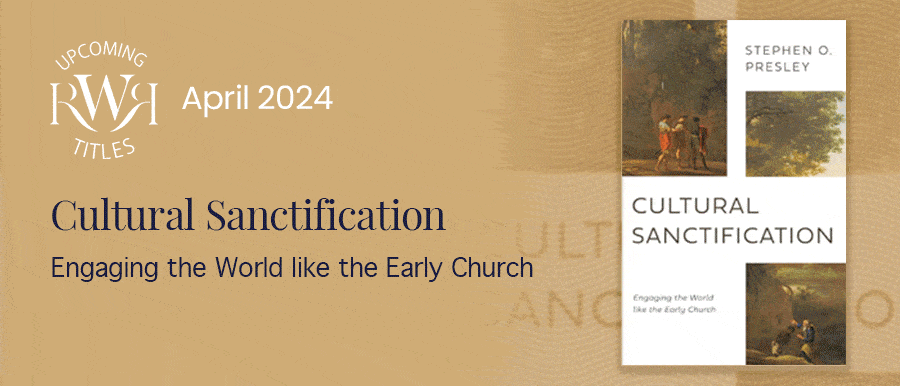A New Protestant Thomism?
In 1976, Jesuit scholar John Patrick Donnelly published an influential article on the late sixteenth-century Protestant scholastic Jerome Zanchi, hailing him as “the best example of Calvinist Thomism.” But although there were many other Calvinist Thomists to study, Donnelly was quite alone in his concern for this early modern Thomist revival. One has to go back to 1948 to find anything similar to his article, when John Ryan published a work on the reputation of Aquinas among English Protestants. Not only are these publications thirty years apart, but they are also specialized studies in rather obscure journals.
Compare this situation with that of recent years. 2017 saw the publication of Aquinas Among the Protestants, a collection of essays that I edited with David VanDrunen. The time was ripe, we thought, for a volume that included both the Protestant reception of Aquinas and contemporary engagement with his work. Barely four years later, The Oxford Handbook of the Reception of Aquinas was published. Edited by Matthew Levering and Marcus Plested, it included seven chapters on the Protestant and four on the Orthodox reception of Aquinas (alongside the many forms of Roman Catholic reception, of course). The Centre for Classical Theology has now announced a series of books entitled “Thomas Aquinas for Protestants.” Edited by Matthew Barrett and Craig Carter, it will begin releasing in 2026. What started as a few scattered and specialized studies separated by decades, has turned into a movement of regular engagement with Aquinas and a fairly global recognition of his place in most Christian traditions (or in a shared Christian intellectual tradition).
Never Doubt Thomas
It is primarily with this kind of apologetically driven Protestant Thomism that Francis Beckwith’s Never Doubt Thomas interacts. Beckwith’s own story is one of conversion from Catholicism to Evangelicalism and then back to the Catholic Church. This book is not autobiographical, but elements of his own story are obviously present in his evaluation of the Protestant Thomists he discusses. He found a great love for Aquinas among some Protestants (he writes of the “doting Thomists”), but also a selective reading of Aquinas’ work. Beckwith describes his own past as one of “taking from the ‘Angelic Doctor’ what I thought was helpful to my Evangelical faith but largely ignoring writings that would force me to think more critically about my commitments on subjects such as grace, the sacraments, and the nature of the church.” The partial Thomism he critiques in this book, however, does not focus on these theological issues, but rather on contemporary questions about the existence of moral norms, the way in which the difference between Muslim and Christian understandings of God should be addressed, and the relationship between religion and science.
After an introductory chapter, Beckwith concentrates on the following topics. First, there is the question of natural theology and natural law, which he addresses under the title “Aquinas as Protestant.” His main point here is that some Protestant critics have portrayed Aquinas as holding to an exaggerated account of the power of human reason, even suggesting that the preambles of faith are somehow an intellectual prerequisite of faith. He then moves on to the problem of religious pluralism, or “Aquinas the pluralist.” Readers will recall the case of Larycia Hawkins, the Wheaton College professor who was suspended after writing that Christians and Muslims worship the same God. Beckwith takes this case as a starting point for a discussion of a Thomistic approach to the “same God” question. Under the title “Aquinas the Theologian,” Beckwith then turns to the issue of intelligent design (ID) and the question of the Thomistic or non-Thomistic character of this movement in the debate on religion and science. Finally, the question of justification is discussed in the chapter “Aquinas the Evangelical.” Here, almost exclusively, he moves beyond Aquinas’s philosophy to considerations of his place in the history of Christian theology.
The first of these chapters deals with a perennial question. Since we share neither the Old nor the New Testament with Muslims and pagans, we must discuss with them on the basis of “natural reason, to which all men are forced to give their assent.” This is a well-known passage from the beginning of the Summa contra gentiles. But it is important to note that Aquinas states that “in divine matters the natural reason has its failings.” Although he does not discuss this particular text, Beckwith offers a balanced description of Aquinas’ account of human reason and its powers, one that is very much in line with this proposition. And he is right, of course, to say that there has been an exaggerated account among both critics and defenders of Aquinas. But while he offers a sober account of Aquinas, one wonders whether his account of Protestant views of human reason is equally balanced. Beckwith is well aware of the recovery of natural theology and natural-law thinking in the more recent Protestant trajectory. Nevertheless, in this chapter, he opts for an understanding of Protestantism as a “cluster of beliefs that imply or affirm that the human intellect is completely incapable of knowing anything about God or morality apart from special revelation.” Beckwith is right, of course, in taking the Protestant critics of natural law and natural theology seriously, but presenting their position as almost the definition of Protestantism—as he does in at least some places—perpetuates misunderstandings that should be left behind.
Let us turn to the second question, what Beckwith calls “the same God question.” Do Muslims, Jews, and Christians worship the same God? Although the subtitle of this book draws our attention to “the Catholic Aquinas as Evangelical and Protestant” rather than “the Catholic Aquinas as pluralist,” this is, in my view, its best chapter. To understand its importance, it is worth emphasizing that this book was not written for specialists in Aquinas, but for “educated and interested nonspecialists, both inside and outside the academy.” And both inside and outside the academy one can see believers struggling to find words that adequately express the fact that our descriptions of God only partially overlap. If being faithful means recognizing that some of our beliefs about God and salvation history are incompatible, is it not unfaithful to say that we worship the same God? Beckwith is well aware of the slippery character that “same God” talk can have, and he does not push for an abstract interreligious “monotheism.” But while he avoids becoming too technical, he offers a good example of the clarity that a basic philosophical framework can bring to this kind of debate. Partly incompatible claims can be made about the same reality, and Beckwith makes good use of the distinction between sense and reference to drive this point home. Moreover, as he rightly points out, this question touches not only on the discussion of pluralism, but on the very core of classical theism: if there is only one God, if God is not one of a kind, then there must be room for the (significant or limited) extent to which the same God is worshiped by different faiths.
Questions of philosophical theology also dominate the chapter on intelligent design. Here, however, the question is more precisely whether a given position is Thomistic. As is well known, intelligent design attempts to defeat naturalism by identifying cases of irreducible complexity. Beckwith is not concerned with the extensive discussion of the merits of specific findings and claims in ID. The central question for him is whether ID operates with an adequate understanding of causality, or whether it, in fact, has the same view of divine action and intervention that one finds in creationism, a view in which natural causes and divine action compete. His claim, in short, is that ID fails for this very reason, and that Aquinas’ view of divine action provides a more helpful framework for dealing with these sorts of problems.
Finally, the book turns to the question of justification. Here Beckwith argues that the Protestant Thomists with whom he engages have a “spectacularly false” narrative when they claim that Aquinas is closer to Protestant soteriology than to Trent. He is right to observe that enthusiasm (or love, as he writes) has led to some rather exaggerated claims. Indeed, the traditional Protestant reading of Aquinas has rarely claimed such significant agreement on matters such as justification. But I wonder whether Beckwith is right to claim that the difference on justification lies in a Protestant abandonment of “the idea of participation in the Divine Nature.” While rejecting Aquinas’s view of justification, John Fesko has shown that some post-Reformation Protestants continued to use his category of infused habits in their doctrines of sanctification. Questions such as these suggest that much work remains to be done when it comes to Aquinas’s relationship with Protestantism.
The Way Forward
As noted above, we can distinguish at least two broad approaches to Aquinas among contemporary Protestants. The history of Protestant reception of Aquinas has been the more characteristic recent concern. When we compare that reception with the older, apologetic engagement with Aquinas, we see that sixteenth- and seventeenth-century Protestants did not turn to Aquinas primarily as a Christian philosopher or apologist. They did not need such an apologist, and when it came to philosophy they could turn to Aristotle on their own, as they did massively. Aquinas was read primarily as a theologian. Moreover, while Aquinas was more present to them than to contemporary evangelicals, no one claimed the title of “Thomist.” Aquinas’ work was, in a sense, simply an extraordinary synthesis of the earlier Christian intellectual tradition. The early Protestants were not selective Thomists, for they did not pretend to be Thomists. But they were grounded in a wider Christian tradition, partly mediated by Aquinas, and this protected them from many of the pitfalls that Beckwith had identified.
Now that Aquinas has become our fellow apologist and Christian philosopher, we arguably need something of the same approach. Even in some of the debates that Beckwith touches on in this book, it is the God of classical theism rather than a set of specifically Thomistic theses that is being recovered. But Aquinas is, of course, one of the finest intellects within that tradition, and sometimes it is his distinctive view of the world, of divine causality, and of the relationship between faith and reason that we need.
Manfred Svensson (Dr. Phil. Munich 2007) is Professor of Philosophy at the University of Los Andes, Santiago de Chile. His work is dedicated to the Augustinian tradition, to questions of continuity and discontinuity between medieval philosophy and the Protestant Reformation, and to contemporary authors like Kierkegaard, Bonhoeffer and C. S. Lewis. He has great interest in rival understandings of toleration. He tweets @SvenssonManfred.

Join the Mailing List
Check Out Our Upcoming Reviews
Physical books are at once a conduit for conveying complex and well-developed ideas and an artifact of the time and place from which they come. Beginning January 2024, each month the Reading Wheel Review (RWR) will select one book to engage and then each week we will publish a different engagement with that text, typically a review, an excerpt, a substantively related essay, or an interview with the author or a figure who works in the field represented by the book we’ve selected. We look forward to sustained engagement with a variety of books, both new and old, as we launch and grow the RWR. Sign up to keep connected.

